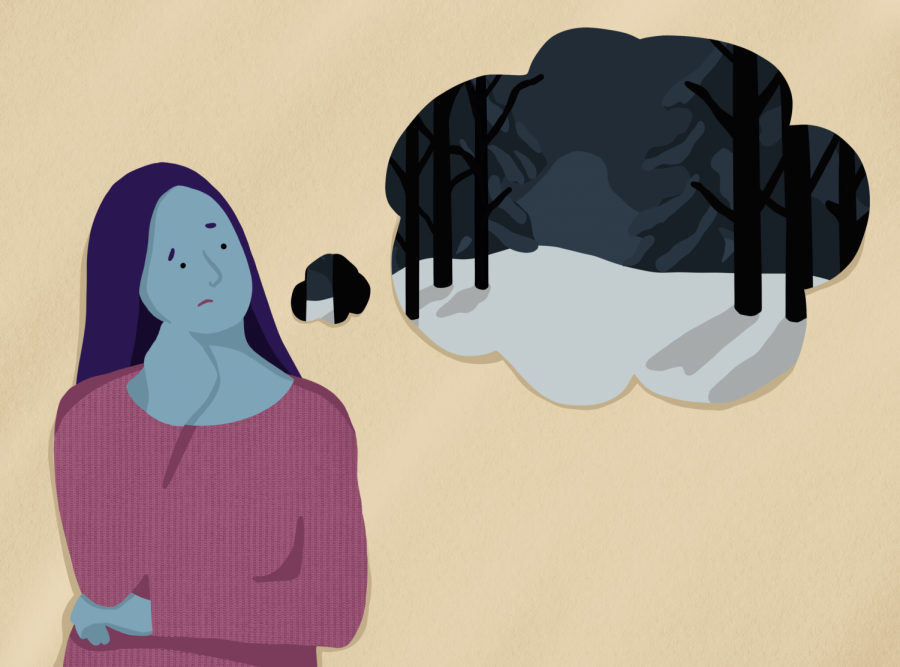Students struggle with seasonal affective disorder during winter
Mar 3, 2021
As the days remain dark and gloomy, a feeling of lethargy and sadness is present in many students. While there has been a breath of fresh air as spring approaches, students may continue to feel the effects of seasonal affective disorder, more commonly known as seasonal depression.
Seasonal affective disorder is a subset of depression that is related to a change in the season, Dr. Robert Woodward, Medical Director of McKinley Health Center, said. The change in mood typically begins and ends around the same time every year, with most prevalence during late fall and winter.
In comparison to other types of depression, like chronic and acute, seasonal affective disorder differs. While diagnosis criteria differ among medical professionals, a history of the same symptoms during different times of the year when the weather changes can help support a diagnosis.
“(Seasonal affective disorder) differs from other depression,” Woodward said. “The patient is not being exposed to an acute event like the death of a family member or having symptoms that are pervasive throughout the year.”
Amy Wiedmann, Clinical Counselor at the Counseling Center, said symptoms of seasonal affective disorder may include mood changes, losing interest in activities, changes in appetite or weight, unexplained aches and pains, in addition to a change in sleeping patterns.
Get The Daily Illini in your inbox!
“Seasonal depression oftentimes has the same sorts of symptoms as other sorts of depression,” Wiedmann said. “The difference that makes it unique is that it usually occurs at around the same time every year.”
Although seasonal affective disorder might not be persistent or particularly significant for those who suffer from it, there are different ways to combat and manage it.
While some turn to more medical techniques, such as light therapy or counseling, others can incorporate specific behaviors into their daily life that help to control it. From participating in daily exercise to taking the time to make social connections, the feelings and symptoms may decrease.
However, being able to engage in activities like this is more difficult due to COVID-19. The stay-at-home order has influenced all factors of life and has left an impact on people’s mental health, leading many students to feel isolated. Ashley Clarke, freshman in LAS, said she has experienced this isolation.
“If COVID wasn’t a thing, we could go out in the winter and we could hang out and go to places,” Clarke said. “We can’t do that right now. I’m stuck in my dorm most of the time, and I don’t really see the sun.”
For many, the feeling of isolation has heightened with the pandemic. Many restaurants and activities are not available or recommended, making it difficult for many people to have social interactions, Woodward said.
“It is my opinion that most people crave human interaction, even if, for example, it is just going out to lunch,” he said. “Many do not wish to meet up with people during the pandemic, so they do not take advantage of lunch as an excuse to get out during the daylight hours.”
The virtual aspect of school and classes has also added to the symptoms of seasonal depression for some. Without having in-person classes, many students are left without a routine which can have an adverse effect on seasonal affective disorder, Wiedmann said.
“That’s the thing with COVID,” Clarke said. “We never stop with school. We could do the entire semester if we wanted. There’s never that clear cut: ‘I’m in class right now. I’m done.’”
With the feelings of seasonal depression and its impact, there are also many resources the University offers for students and faculty to utilize. Although it can be difficult to reach out for help during a time of the pandemic, there are many options for students to explore, Wiedmann said.
“There’s such variety,” she said. “Even if a student only comes one time and feels like they got what they needed, then it’s a wonderful thing for everyone involved.”
McKinley Health Center has 22 primary care providers for students to see in regard to mental health disorders, Woodward said. Additionally, McKinley offers a program that provides students with the opportunity to access light therapy from the Mental Health Unit in an attempt to combat seasonal affective disorder. Appointments can be made either in-person or via telehealth from 8 a.m. to 4:30 p.m. Monday through Friday.
The Counseling Center also offers mental health resources and therapy. Students can call 217-333-3704 to connect with a counselor and schedule an appointment. Additional resources include Kognito, an at-risk training program, as well as their social media.






